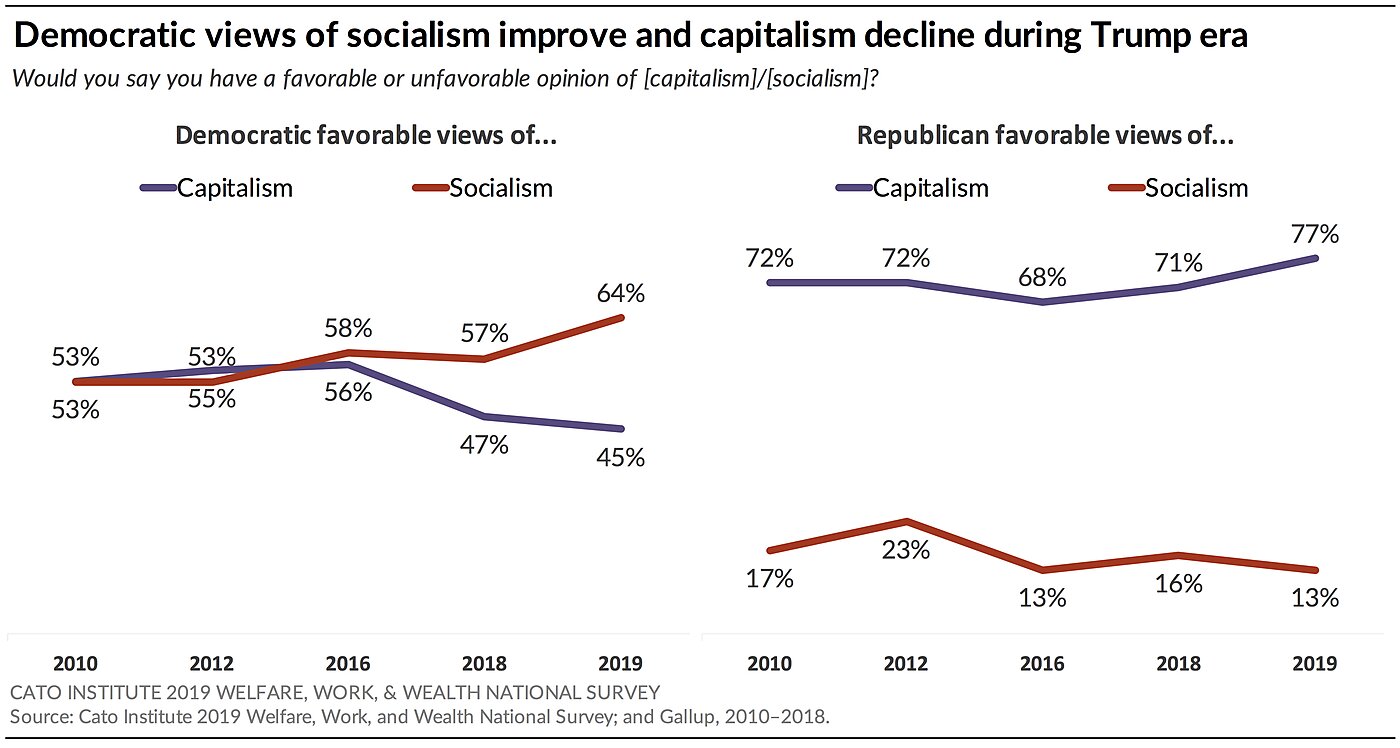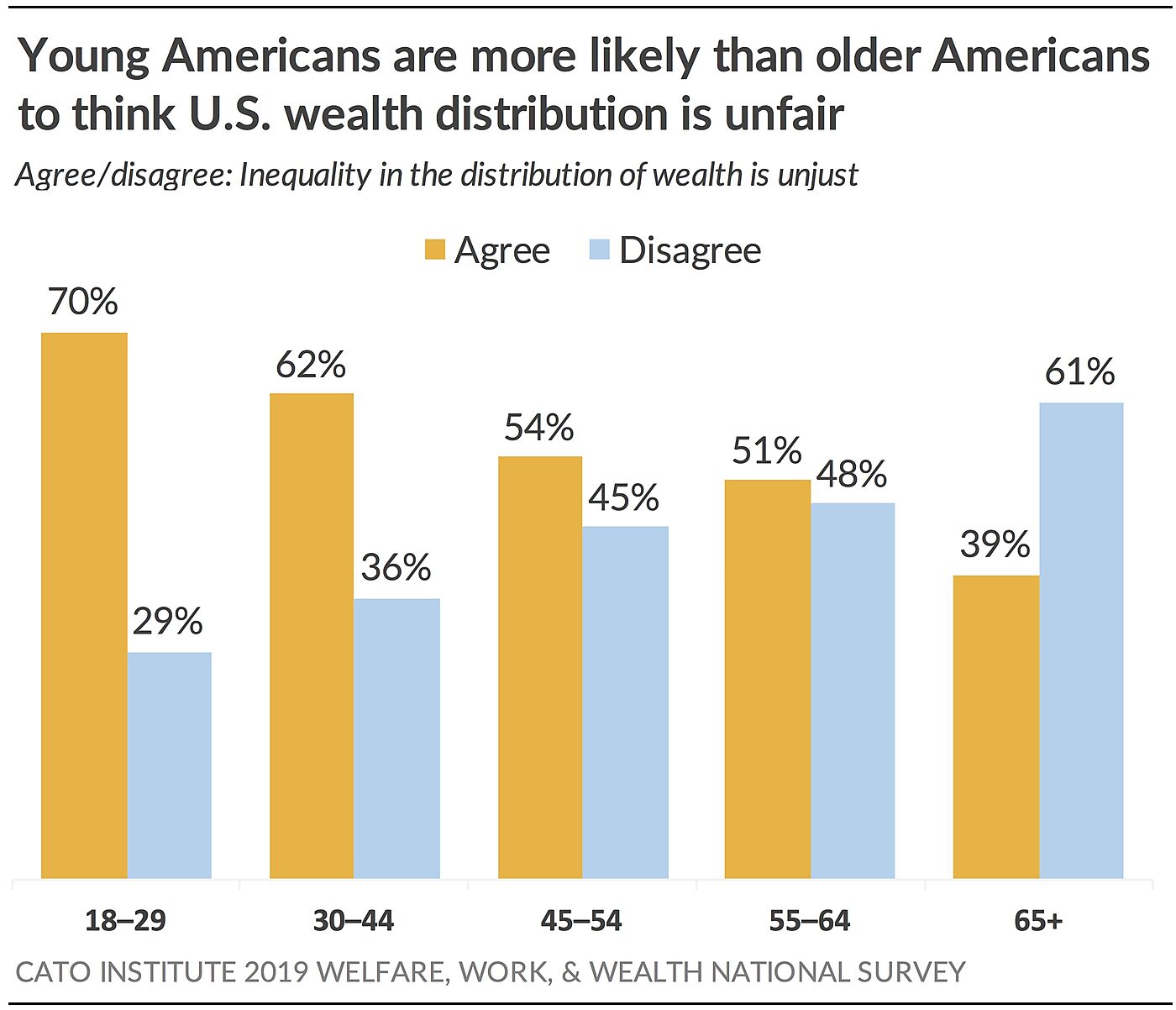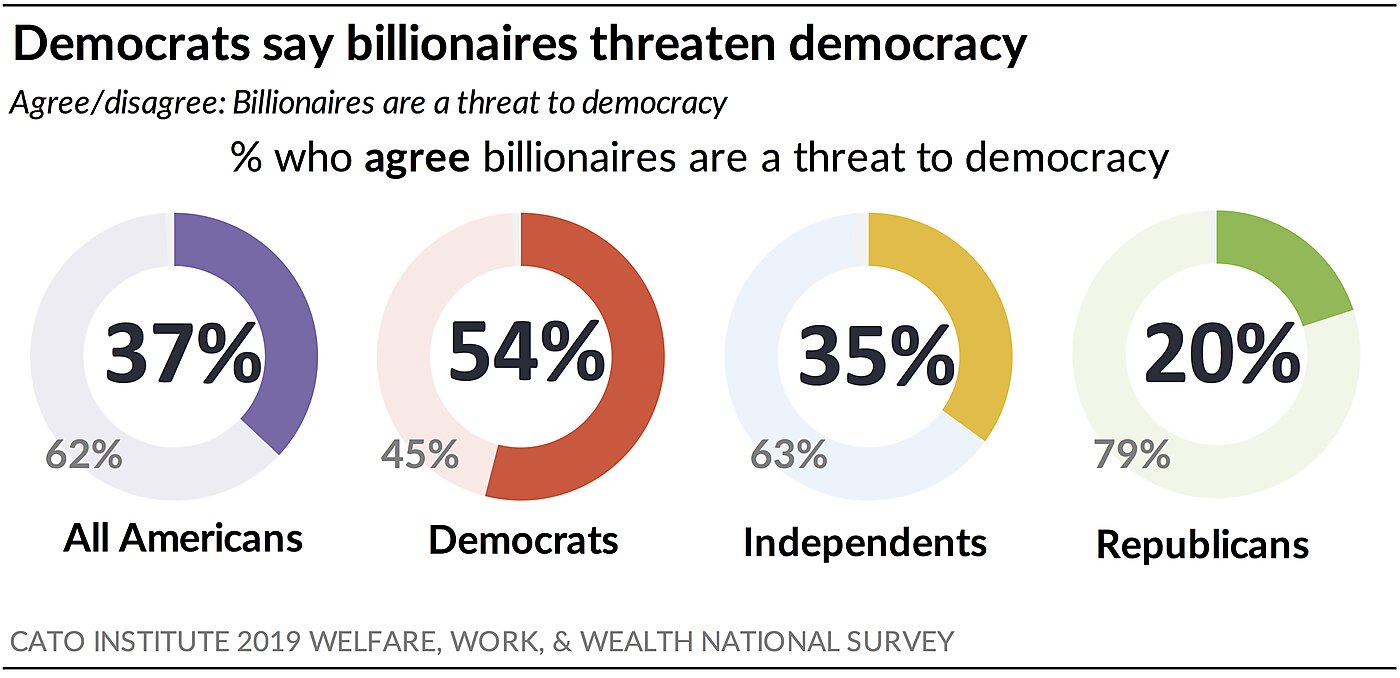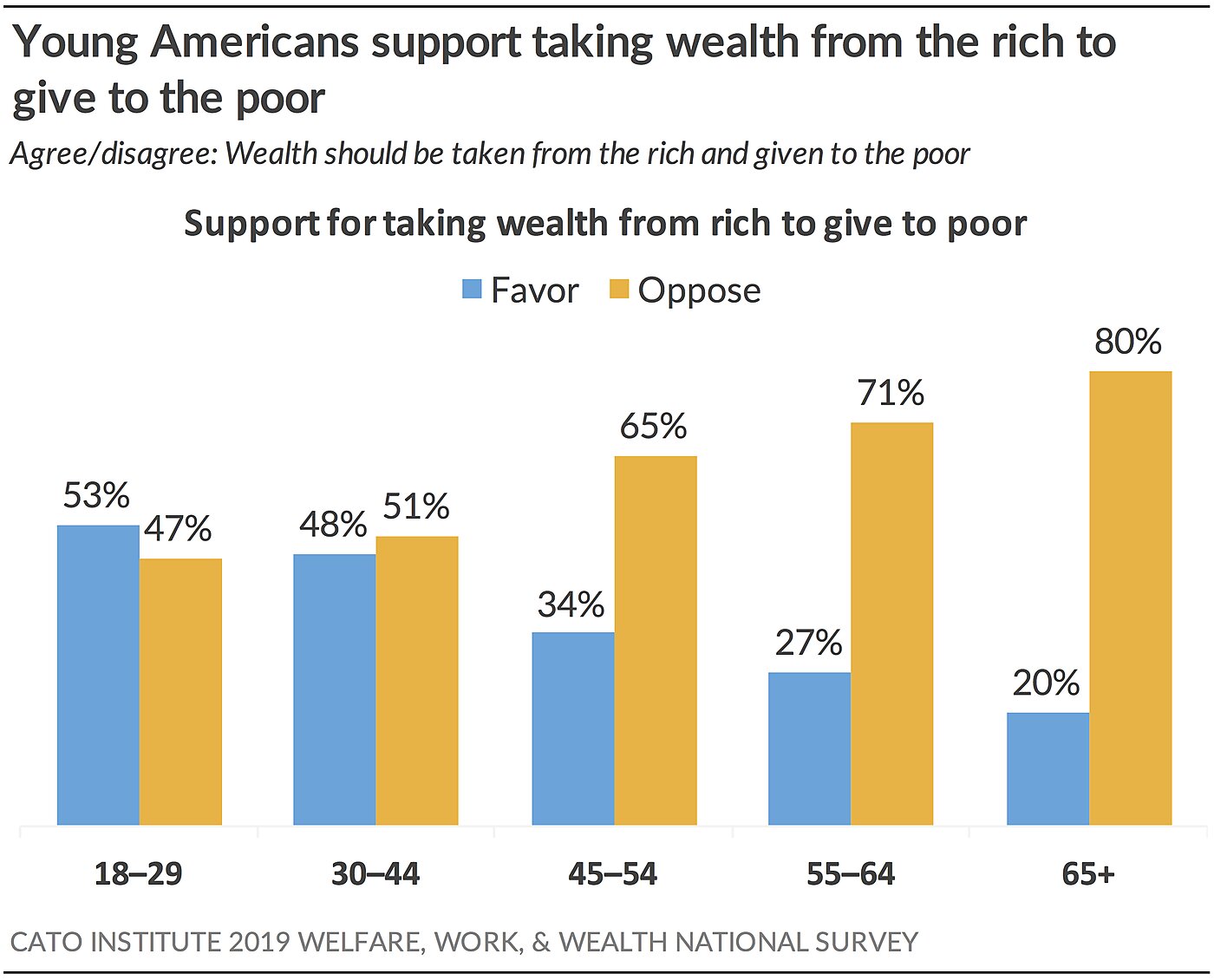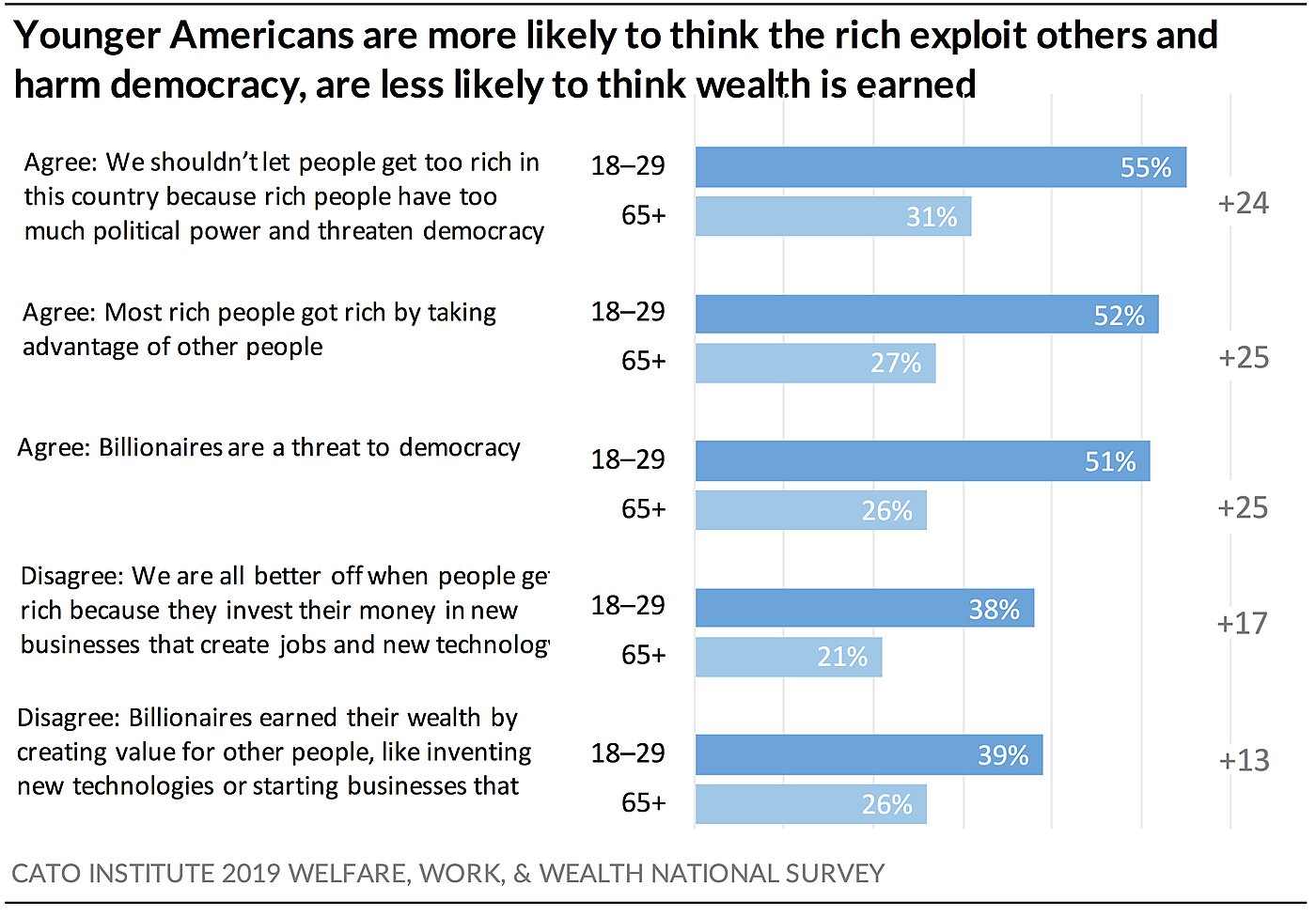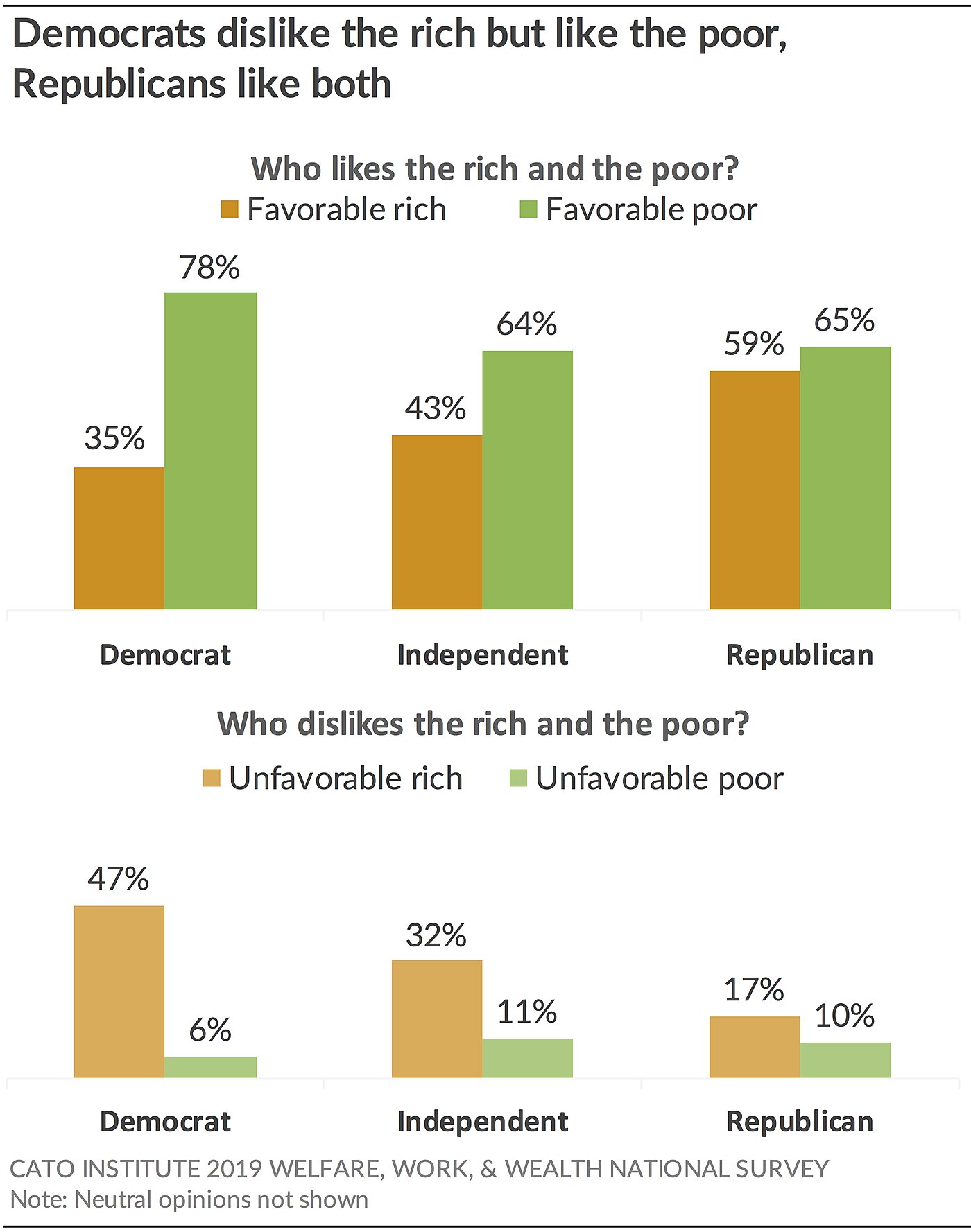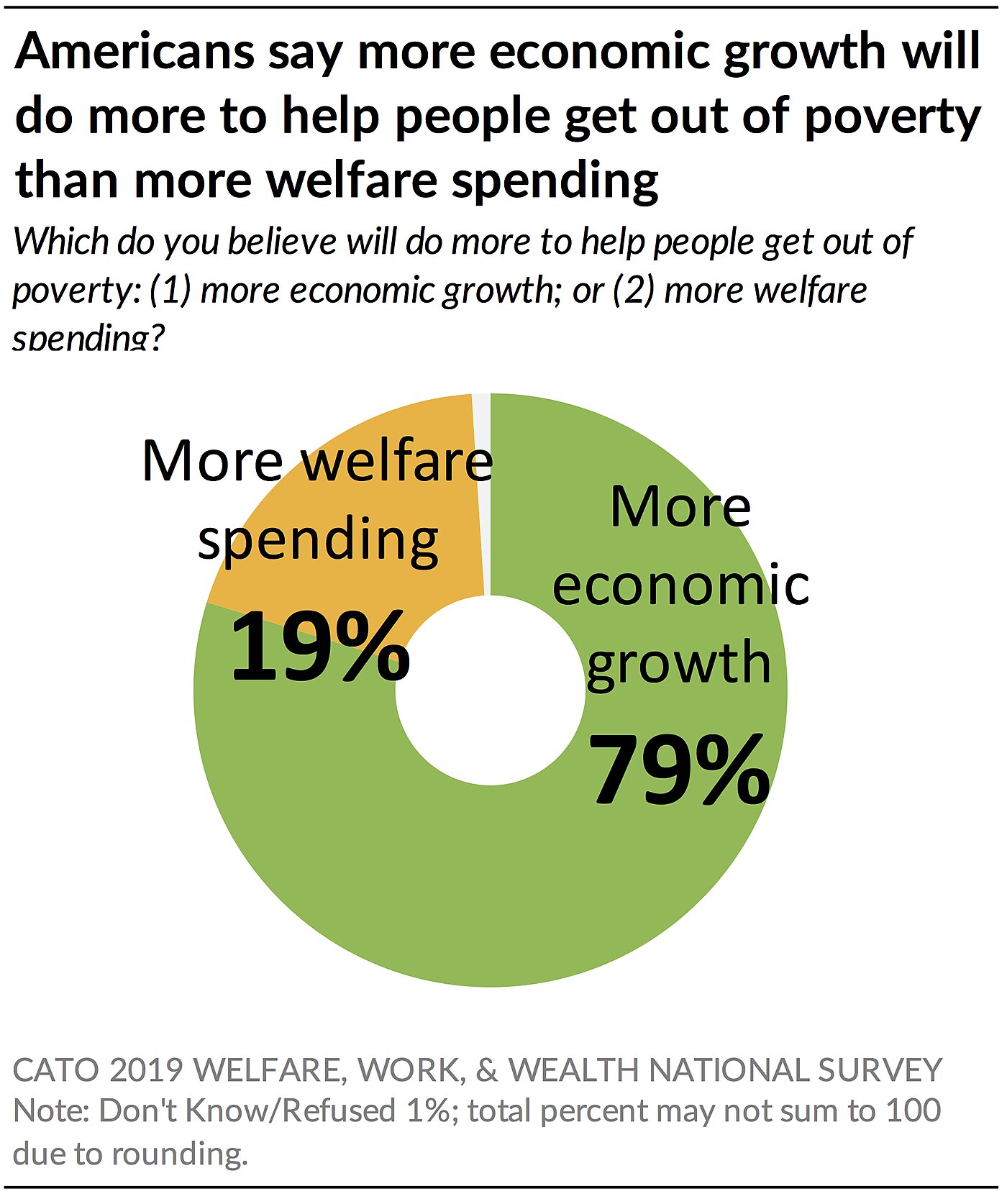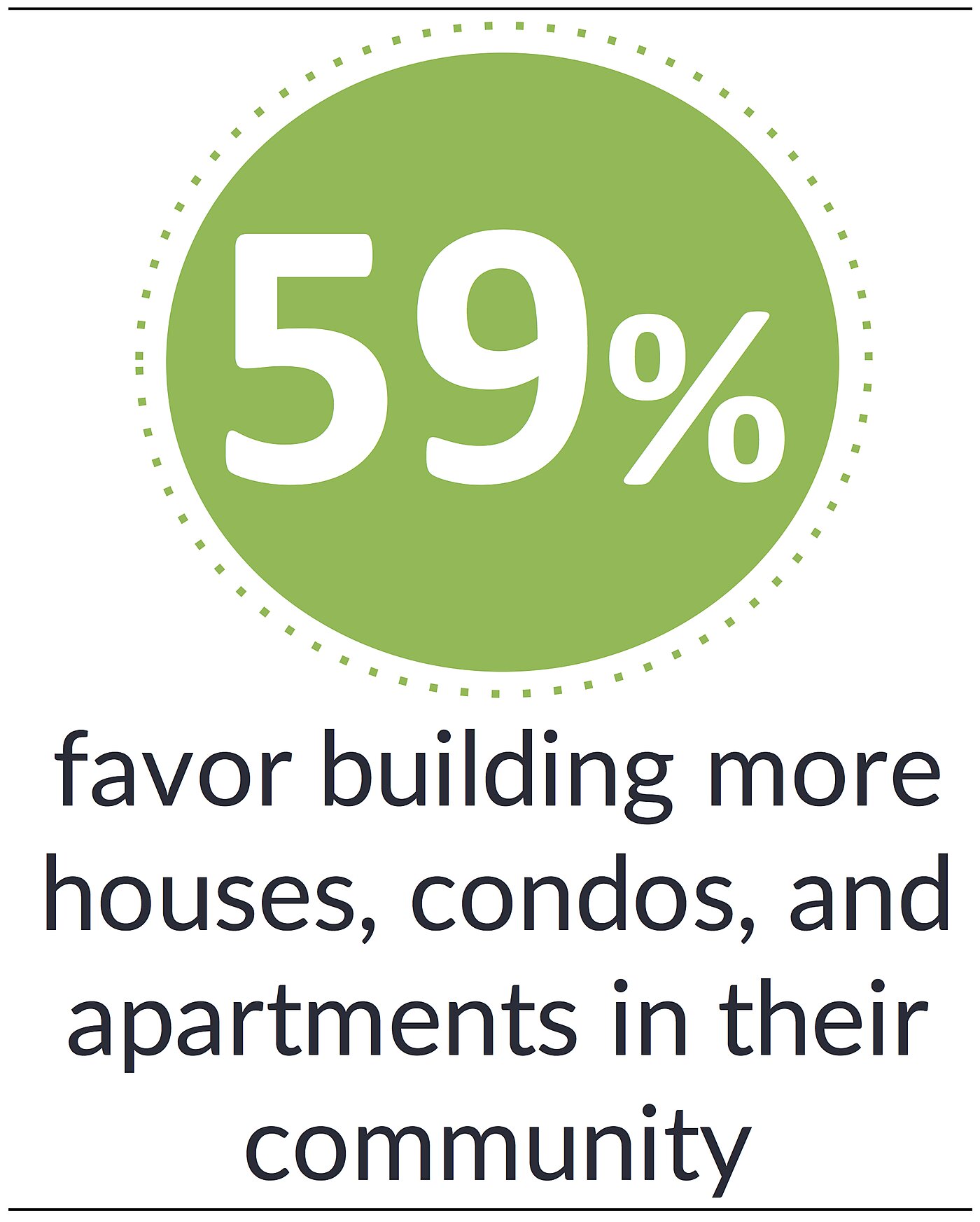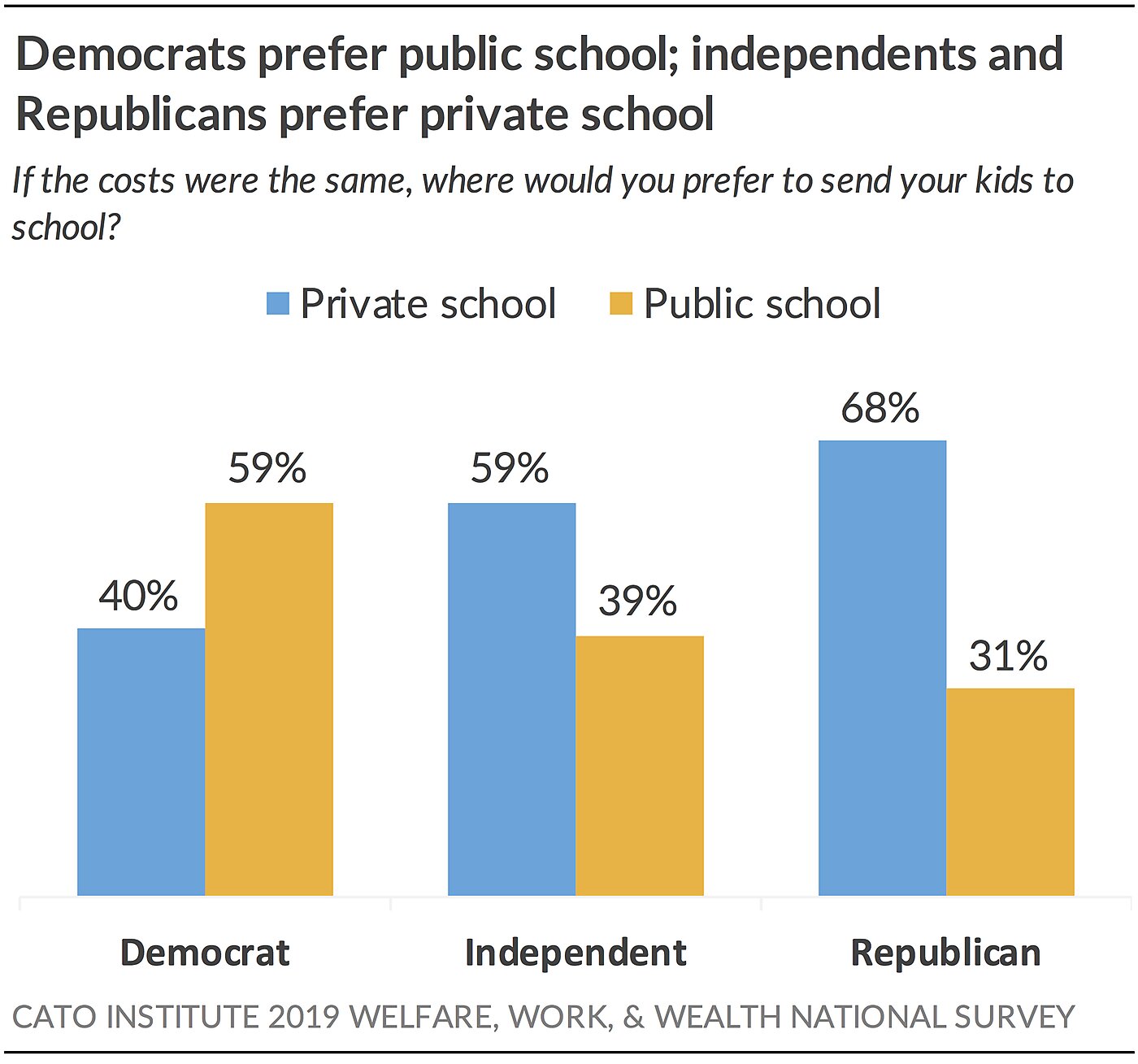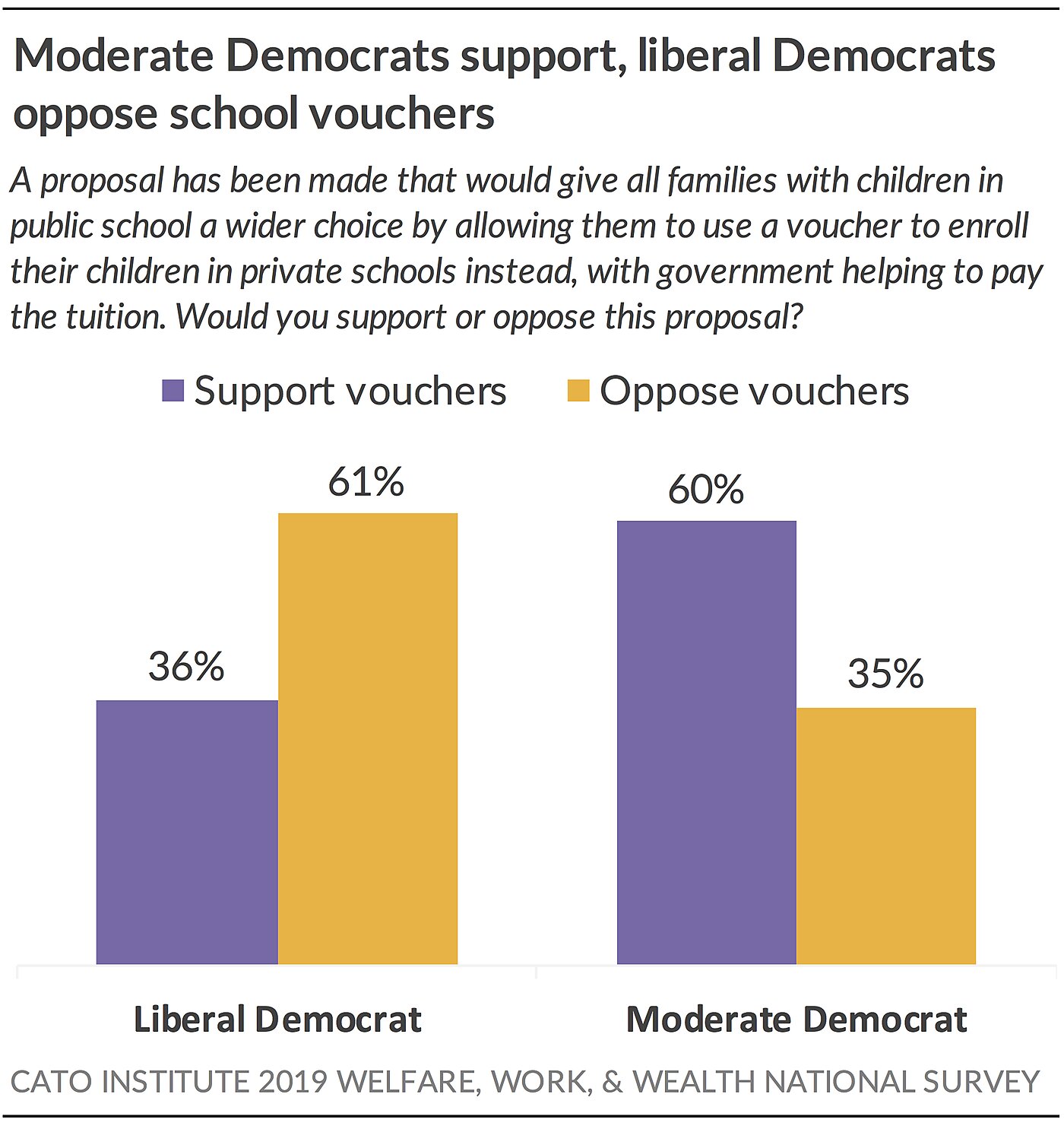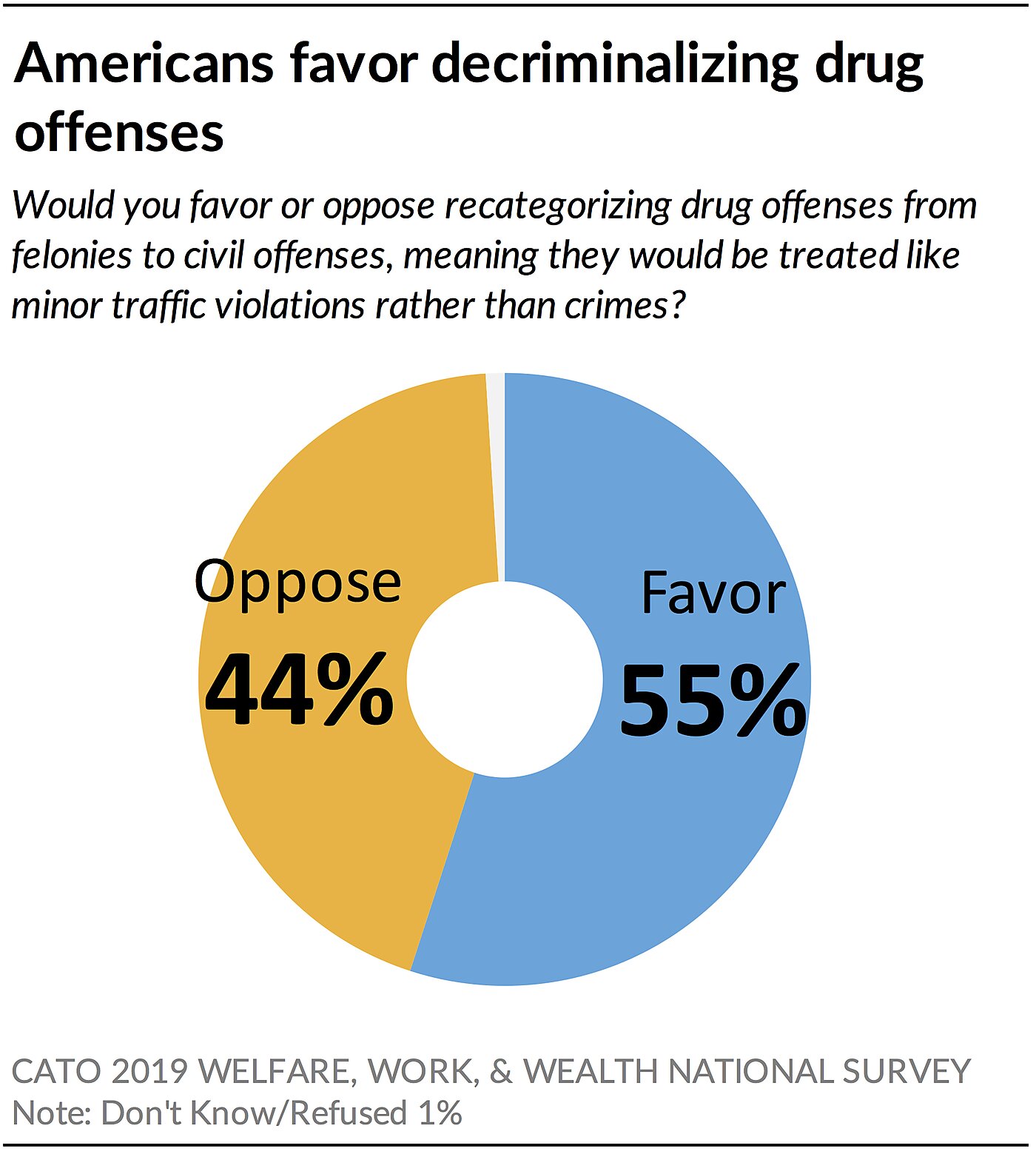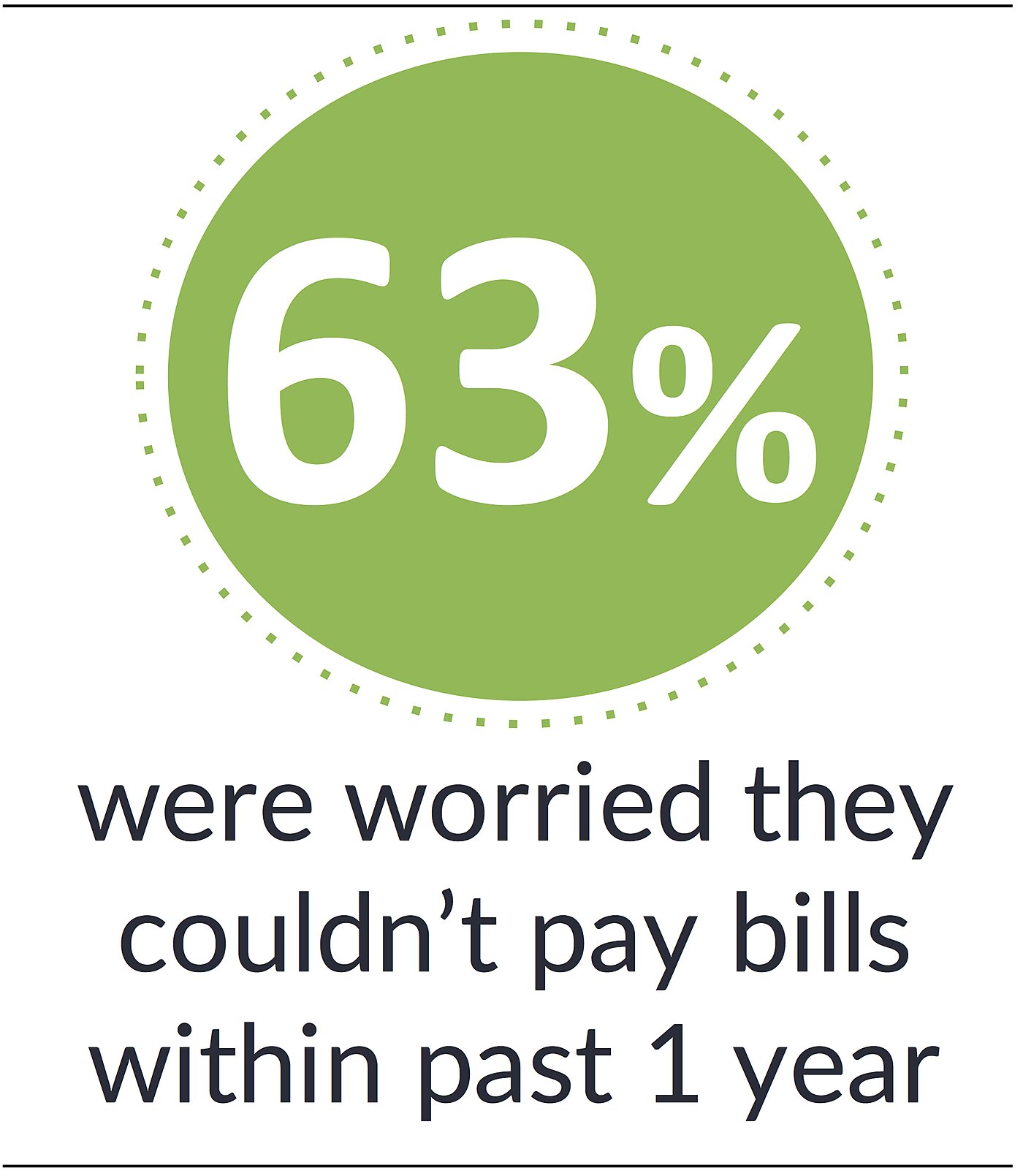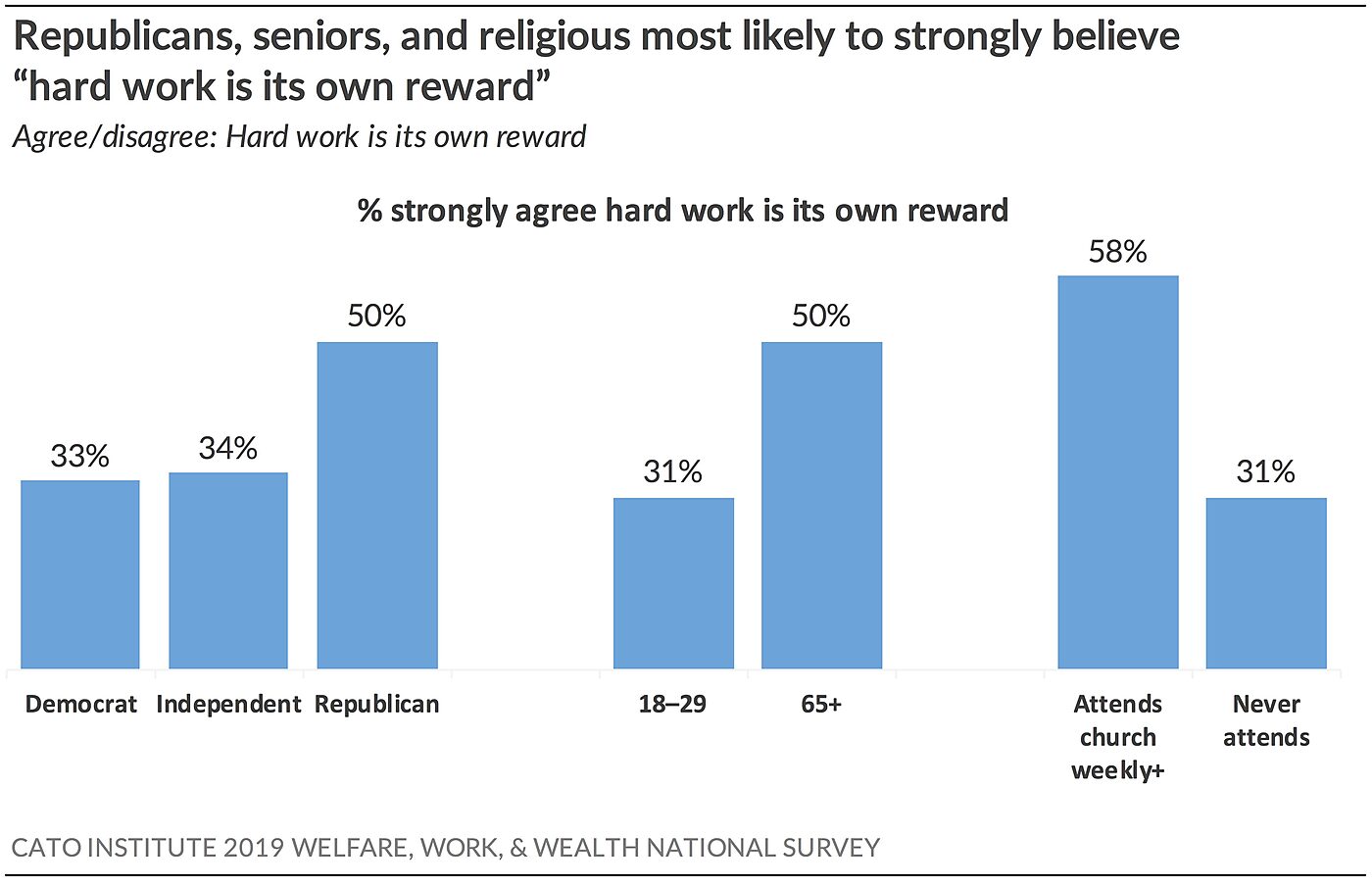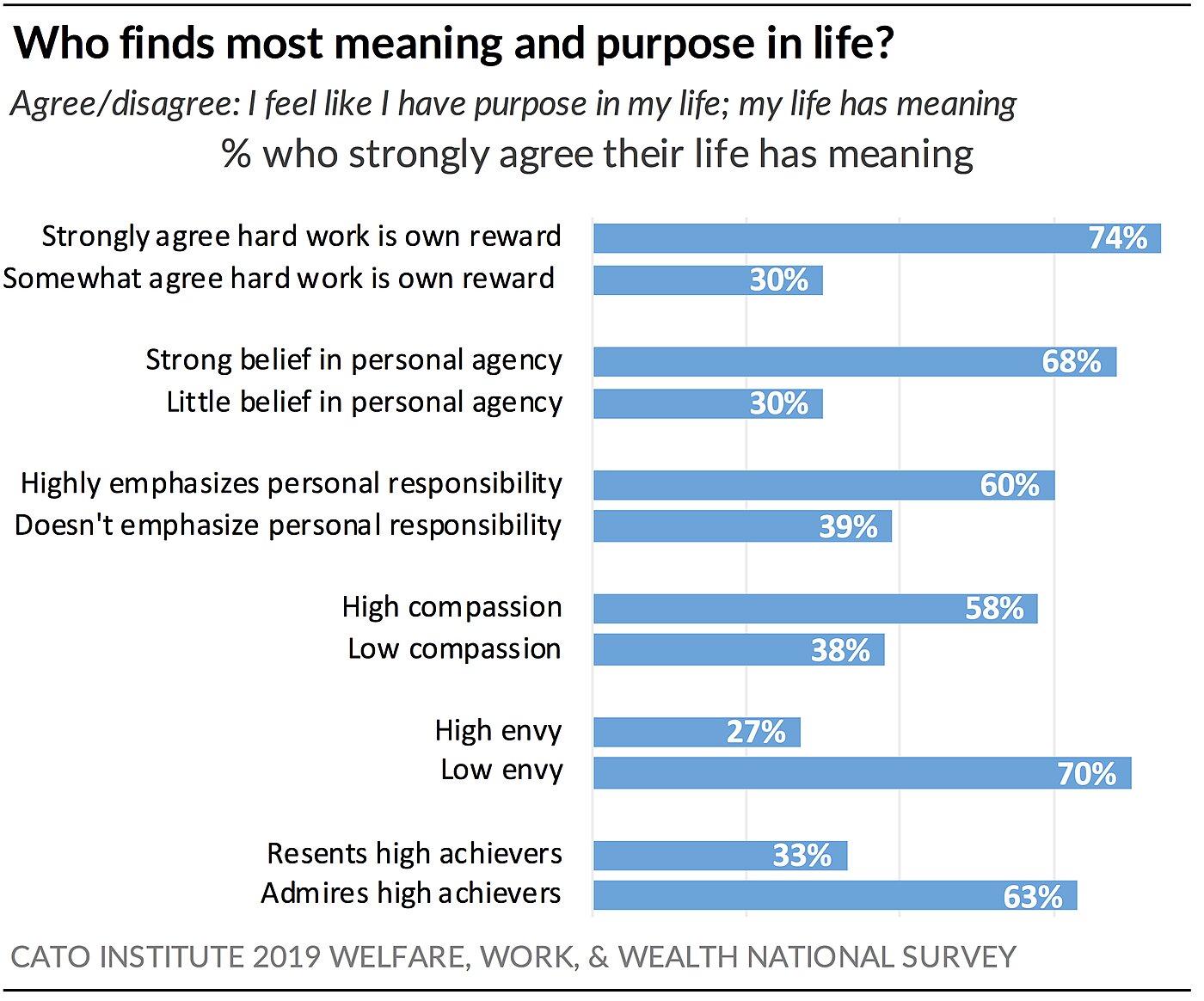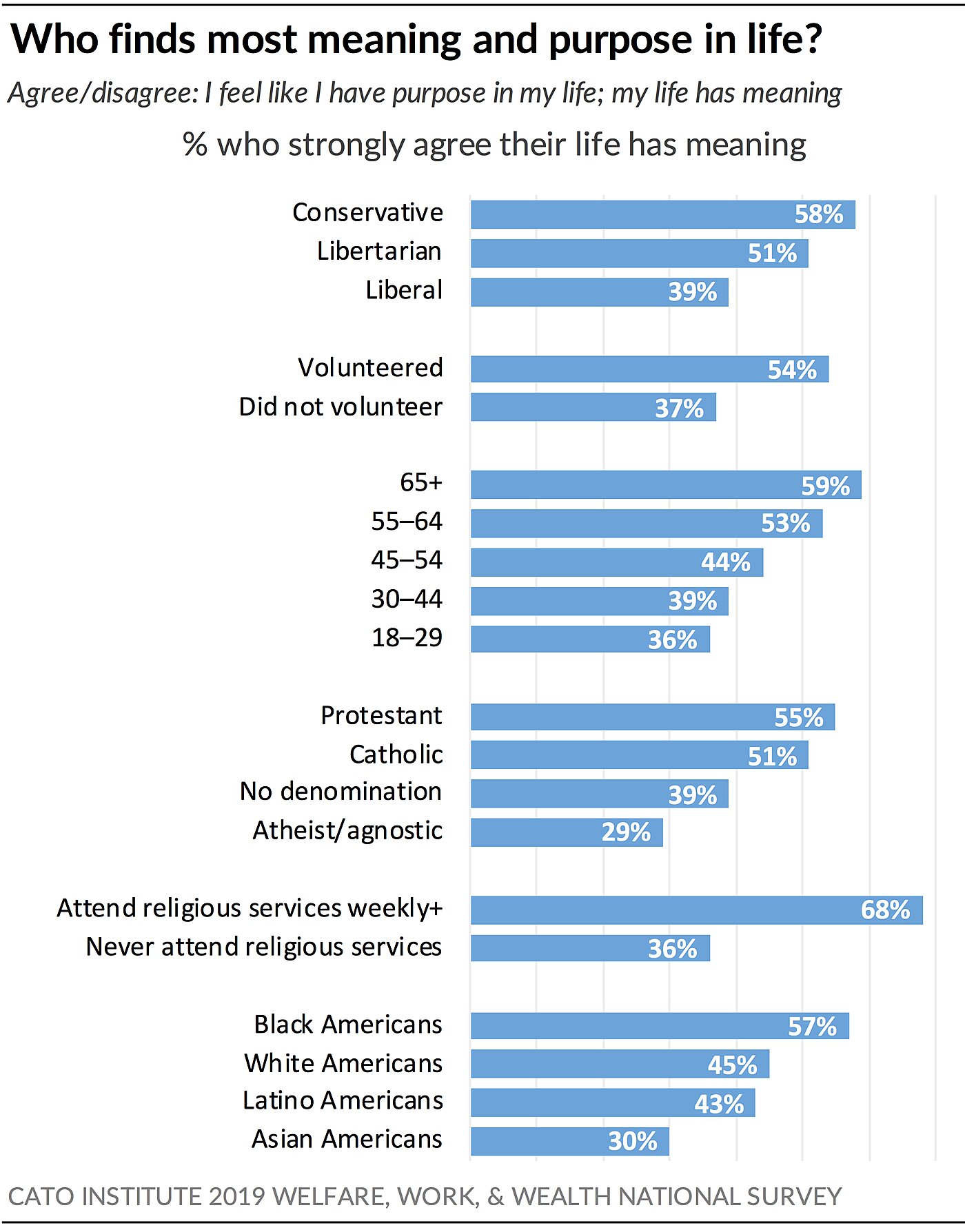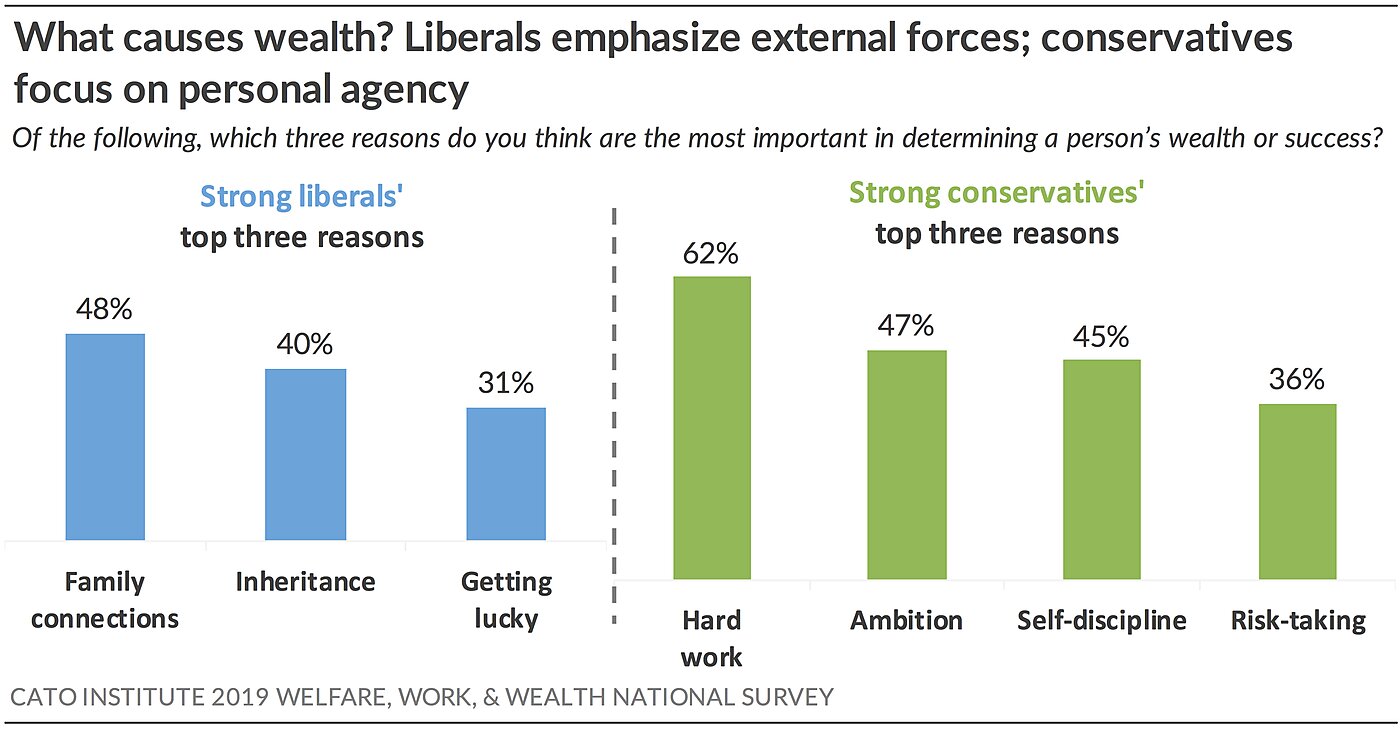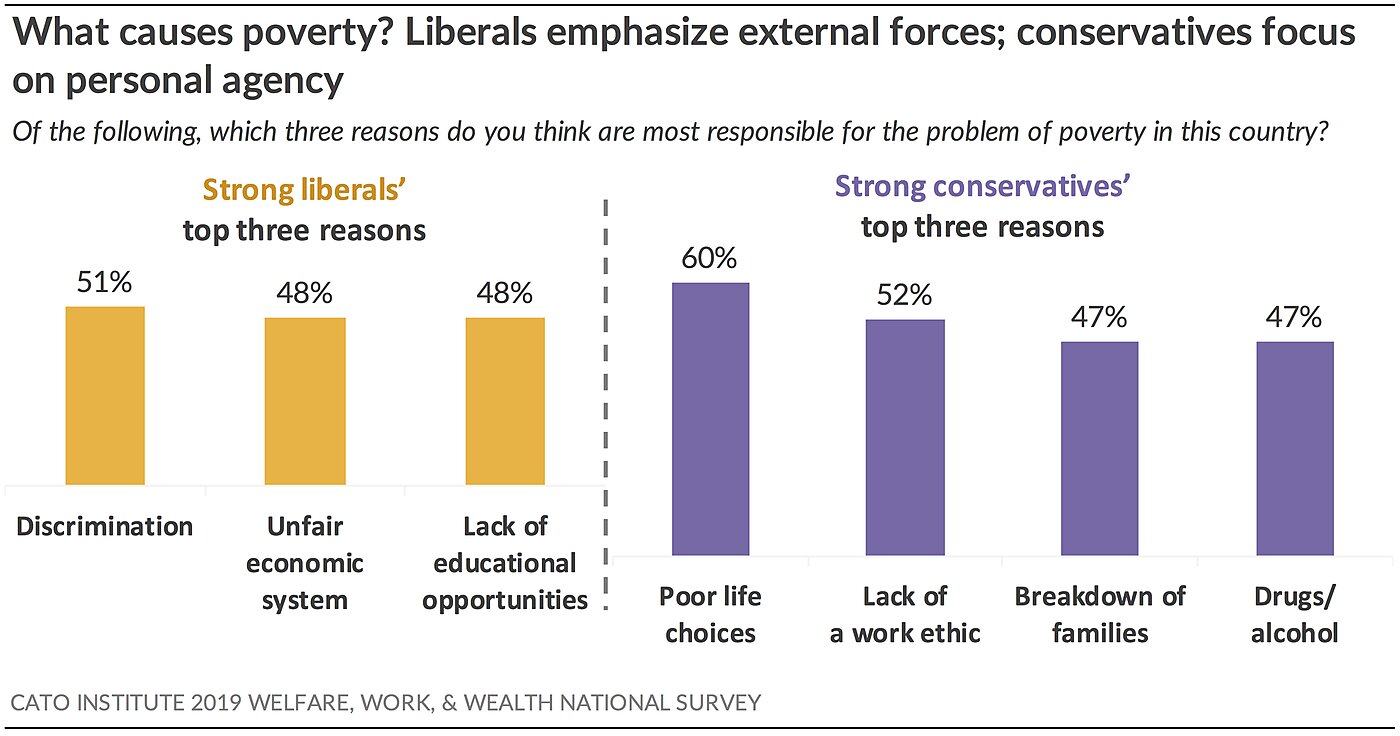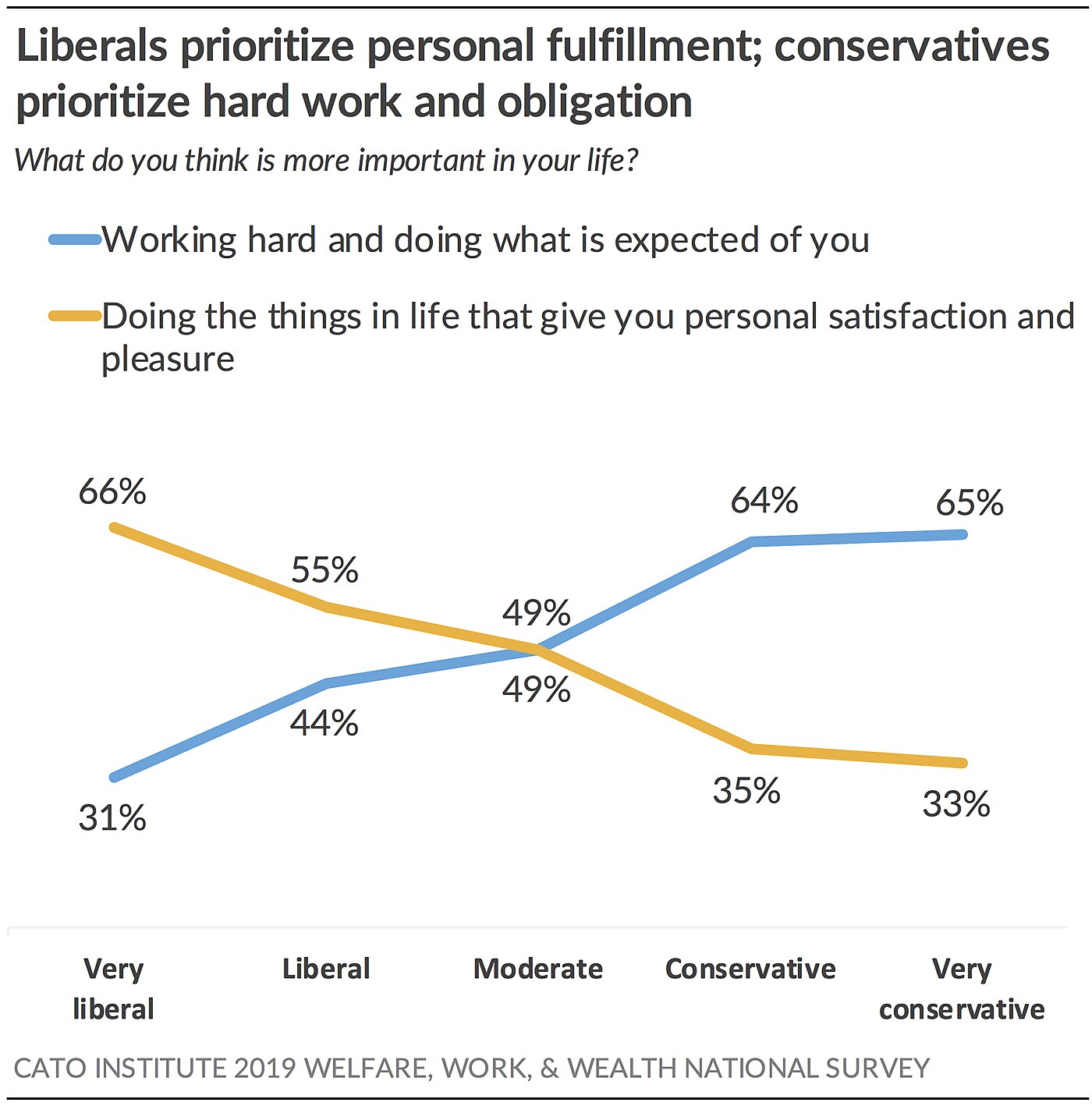Democrats Say Trump Has Soured Their Views of Capitalism; Americans Support Raising Income Taxes on Rich but Not Wealth Redistribution, Democratic Coalition Divided over Socialism, Americans Say Billionaires Aren’t “Immoral,” Most Say Gov’t Efforts to Fight Poverty Are “Ineffective,” Americans Support Building More Housing, School Vouchers, Decriminalizing Drug Offenses
The Cato 2019 Welfare, Work, and Wealth Survey, a new national poll of 1,700 U.S. adults, finds that 84% of Americans say there is nothing wrong with trying to make as much money as one honestly can. The survey also finds the public believes that growing the economic pie benefits more than just the wealthy: 79% say economic growth will better help people climb out of poverty than more welfare spending.
Democrats Turn Toward Socialism During Trump Era
More Democrats today have favorable views of socialism (64%) than capitalism (45%). But before Trump took office, polls found Democrats were about equally favorable toward capitalism (58%) and socialism (56%). Most Democrats credit Trump with this shift. Half (50%) say Trump has made them “like capitalism less.”
In contrast, most Americans have unfavorable views of socialism (59%) and positive views of capitalism (59% favorable). Republicans resolutely pick capitalism over socialism: 77% feel favorable toward capitalism and 85% have negative views of socialism. While most independents like capitalism (52%), more feel negatively toward socialism (58%).
Americans Support Raising Income Taxes on the Rich but Are Wary of Wealth Redistribution
- 61% favor raising taxes on families earning over $200K+
- 53% favor raising top marginal tax rates to 70% on income above $10 million
- 62% oppose redistributing wealth from the rich to give to the poor
Wealth redistribution divides the Democratic coalition. More than two-thirds (69%) of strong liberals agree that wealth should be redistributed from rich to poor, but 53% of moderate liberals disagree. However, Democrats are united in support for raising top marginal tax rates (75%) and raising taxes on incomes above $200,000 (81%). Republicans oppose all three: 70% oppose raising top marginal tax rates, 62% oppose raising taxes on incomes above $200,000, and 83% oppose redistributing wealth. Independents support raising the wealthy’s income taxes but do not support wealth redistribution.
55% Believe the Distribution of Wealth in the U.S. Is Unfair
A majority (55%) of Americans believe that the wealth distribution in the United States is “unjust.” Majorities of Democrats (79%) and independents (55%) agree, but 67% of Republicans disagree. Americans 65 and over are the only age cohort with a majority (61%) who believe the distribution is fair. In contrast, Americans under 30 are the most likely to say it’s unjust (70%).
Americans Believe Rich Create Value for Society, but Say People Admire the Rich Too Much
Americans admire the rich and believe they create value for society as they build up successful businesses that invent new products, create jobs, and provide value for customers.
- 71% feel more “admiration” than “resentment” toward the rich
- 69% agree billionaires “earned their wealth by creating value for others like inventing new technologies or starting businesses that improve lives”
- 65% believe “we are all better off when people get rich” because “they invest their money in new businesses that create jobs and new technology”
But also, Americans worry that admiration for the wealthy can be taken to excess: 75% say that people admire rich people “too much.” Few people (23%) go so far as to feel “angry” when they read or hear about rich people. However, this share nearly doubles to 41% among staunch liberals.
Americans Don’t Believe Billionaires Threaten Democracy or Are “Immoral”
Most Americans (62%) do not believe billionaires are a “threat to democracy,” including 79% of Republicans and 63% of independents. However, a majority of Democrats (54%) worry billionaires do pose a threat. Three-fourths (75%) of Americans also don’t believe that “it’s immoral for society to allow people to become billionaires.”
Attitudes toward the Rich Divide the Democratic Coalition
The survey finds the Democratic coalition is divided along beliefs about socialism and the rich, with implications for the 2020 Democratic primaries. Liberal Democrats are 25 points more likely than moderate Democrats to have a favorable view of socialism (74% vs. 49%) and to strongly favor raising top marginal tax rates (60% vs. 38%). Conversely, moderate Democrats are about 10–15 points more likely to feel more admiration than resentment towards the rich (65% vs. 48%), to believe the rich earned their wealth by creating value for society (64% vs. 48%), and to think “we’re all better off when people get rich” (58% vs. 41%).
Third of Young People Say Violence against the Rich May Be Justified
About a fifth (17%) of Americans agree that “citizens taking violent action against the rich” is sometimes justified. More than a third of strong liberals (36%) and Americans under 30 (35%) and nearly half (47%) of those with very favorable views of socialism say violent action against the rich may be justified.
Young Americans Are More Supportive of Socialism and Feel Greater Resentment toward the Rich
Young Americans (50%) feel more favorably toward socialism than do Americans over 65 (34%). This age gap maps on to increased resentment young people feel toward the rich. People under 30 are about 20–30 points more likely than Americans over 65 to:
- feel favorable toward socialism (50% vs. 34%)
- believe the rich got rich by “taking advantage of other people” (52% vs. 27%)
- believe billionaires are a threat to democracy (51% vs. 26%)
- feel “angry” when they read or hear about rich people (44% vs. 11%)
- believe it’s “immoral” for society to allow people to become billionaires (39% vs. 13%)
- believe that citizens taking violent action against the rich is justified (35% vs. 10%)
- To support redistributing wealth from rich to poor (53% vs. 20%)
- To support raising top marginal tax rates (62% vs. 43%)
There is less difference between young and older people in their support for increasing government assistance to the poor, such as food assistance (46% vs 32%).
Republicans Like the Rich and Poor Equally; Democrats Favor the Poor but Resent the Rich
Republicans have similarly favorable views of both the rich (59%) and the poor (65%). Democrats, however, prefer the poor over the rich. Only a third (35%) of Democrats have favorable views of the rich, while a plurality (47%) have negative views of them. In stark contrast, 78% of Democrats have favorable views of the poor.
Vast Majority of Americans Are Skeptical of Government Efforts to Fight Poverty
A majority (72%) Americans say that even if government were to “spend whatever is necessary” to eliminate poverty it doesn’t “know enough” about how to actually accomplish that.
- 77% say government efforts to fight poverty have been “ineffective”
- 79% say economic growth will better help people climb out of poverty than more welfare spending
- 60% don’t think welfare programs are designed to lift people out of poverty
- 68% of Republicans believe welfare creates dependency; 71% of Democrats think welfare helps people get back on their feet
- 70% say government should try to eliminate causes of poverty rather than increase welfare benefits
Although most Americans are skeptical of government efforts to fight poverty, only a minority (25%) favor cutting government food assistance, the survey finds. A plurality (41%) favor increasing it, and a third (33%) want to keep it the same.
Americans Say Housing Is Too Expensive; 59% Support New Construction in Their Own Neighborhoods
A majority (56%) of Americans say that expensive housing costs have prevented them from moving to a better neighborhood and 44% rate housing costs in their current neighborhood as “bad.” This may help explain why a solid majority (59%) favor building more houses, condos, and apartments in their own neighborhood.
55% of Americans Prefer to Send Their Kids to Private School, 59% of Democrats Prefer Public School
Although about 90% of children in elementary and secondary schools today attend their assigned public school, a majority (55%) of Americans would rather send their kids to a private school. Majorities of Latino (57%), White (54%), and Black Americans (51%), independents (59%), and Republicans (68%) prefer that their kids receive an education from a private school. A majority (59%) of Democrats, however, prefer public school.
58% Favor Vouchers for K‑12 Private School; African Americans, Republicans, Low-Income Americans, and High School Graduates Are Most Supportive
A solid majority (58%) of Americans favor a proposal that would allow parents of children in public school “to use a voucher to enroll their children in a private school” with “government helping to pay the tuition” while 40% oppose.
African Americans (69%), Republicans (68%), households earning less than $20,000 annually (73%), and high school graduates without a college degree (64%) are much more supportive of school vouchers. Although majorities favor, White and Latino Americans (56%), college graduates (52%), and those with annual incomes above $20,000 (55%) are comparatively less likely to support school vouchers. Democrats are skeptical with 47% who favor and 50% oppose the proposal.
School vouchers divide Democrats. A strong majority (61%) of liberal Democrats oppose school vouchers while a solid majority (60%) of moderate Democrats favor them.
55% of Americans Favor Decriminalizing Drug Offenses
A majority (55%) of Americans favor and 44% oppose recategorizing drug offenses from felonies to civil offenses, such that they would be treated as minor traffic violations rather than crimes. Republicans stand out with 59% opposed. In contrast, majorities of Democrats (69%) and independents (54%) support decriminalizing drug offenses.
63% of Americans Were Worried They Couldn’t Pay Bills in Past Year
Nearly two-thirds (63%) report they were worried in the past year that their income wouldn’t cover their bills. This includes 21% who say they were unable to pay their bills, and 42% who were worried but ultimately covered their expenses. About a third (36%) say they weren’t worried about bills in the previous year.
80% of Americans Agree “Hard Work Is Its Own Reward”
Eight in 10 Americans (80%) agree that “work is its own reward,” this includes 40% who strongly agree. Some Americans are more enthusiastic than others. Republicans (50%), seniors (50%), and weekly churchgoers (58%) are about 20 points more likely than Democrats (33%), Americans under 30 (31%), and non-churchgoers (31%) to strongly agree work has inherent value.
Americans Who Value Work, Responsibility, and Personal Agency Find Most Meaning in Their Lives
The survey found that 83% of Americans report finding purpose and meaning in their lives, while 46% strongly feel they have meaning. Some are more likely to strongly agree, including those who:
- strongly believe hard work is its own reward (74%)
- strongly believe they have personal agency (68%)
- strongly believe in personal responsibility (60%)
- are very compassionate (58%)
- are not very envious (70%) or resentful (63%)
The following are also more likely to find greater meaning and purpose in their lives:
- Conservatives (58%) vs. Liberals (39%)
- Very frequent churchgoers (68%) vs. Non-churchgoers (36%)
- Protestants (55%) and Catholics (51%) vs. Atheists or Agnostics (29%)
- Americans over 65 (59%) vs. Americans under 30 (36%)
- Volunteers (54%) vs. Non-volunteers (37%)
- African Americans (57%) vs White (45%) and Latinos (43%) Americans
Liberals say wealth and poverty is largely due to chance; conservatives believe wealth and poverty is largely due to personal choices
- Strong liberals say the top reasons for people’s wealth: family connections (48%), inheritance (40%), and getting lucky (31%)
- Strong conservatives say top reasons for people’s wealth: hard work (62%), ambition (47%), self-discipline (45%)
- Strong liberals say the top causes of poverty are discrimination (51%), an unfair economic system (48%), and lack of educational opportunities (48%)
- Strong conservatives say the top causes of poverty are poor life choices (60%), a lack of work ethic (52%), breakdown of families (47%), and drugs and alcohol (47%)
Democrats Say Seeking Personal Satisfaction Is More Important to Them; Republicans Say It’s Fulfilling Obligation
A slim majority (52%) of Americans say it’s more important to them personally to “work hard and do what is expected of you.” Nearly the same share (47%) alternatively say it’s more important to “do things in life that give you personal satisfaction and pleasure.” This question starkly divides partisans. Nearly two-thirds (65%) of Republicans say it’s more important to work hard and do what is expected of them. A solid majority (57%) of Democrats say it’s more important to do things in life that give them pleasure and personal satisfaction.
59% Say Planning for the Future Is More Important Than Living Today to the Fullest
Nearly 6 in 10 (59%) Americans say it’s more important to “plan for the future and give up things now if necessary,” while 40% say it’s more important to “take one day at a time and live life to the fullest.”
Attitudes differ by income. A majority (55%) of people earning less than $20,000 a year say it’s more important to take it one day at a time and live life to the fullest rather than give up things now to plan for the future. In contrast, 66% of Americans earning more than $40,000 annually say it’s more important to plan for the future and give up things now if necessary.
The Cato Institute 2019 Welfare, Work, and Wealth Survey was designed and conducted by the Cato Institute in collaboration with YouGov. YouGov collected responses online March 5 to 8, 2019 from a representative national sample of 1,700 Americans 18 years of age and older. The margin of error for the survey is +/- 2.2 percentage points at the 95% level of confidence.
Sign up here to receive forthcoming Cato Institutesurvey reports.

